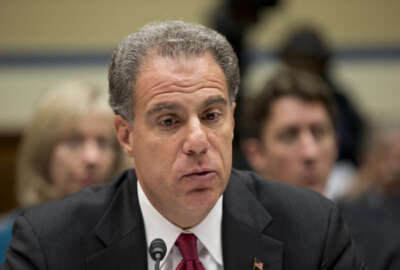Hubbard Radio Washington DC, LLC. All rights reserved. This website is not intended for users located within the European Economic Area.
For the IG community, the case for shared services is clearer than ever
The federal inspectors general community has an opportunity, as the federal hiring freeze and other resources continue to tighten, to share administrative and m...
There is little question across the federal community about the value of agency inspectors general. The amount of money they cost is minimal compared to the amount of money they help agencies save year after year.
Then why is there a growing concern that auditors and investigators are being overwhelmed by hotline calls, data and the sheer number of potential cases of waste, fraud and abuse?
Part of the reason for this challenge are administrations that fail to put actions behind their words. The administrations of Presidents George W. Bush, Barack Obama and many others have talked about the importance of supporting the federal IG community, but they have not adequately made sure each agency’s IG office was well-resourced. Then, in turn, Congress chose not to send more resources to IGs because the president didn’t request it.
“There is no connection between the size of a department and the size of an IG’s office,” said Anthony Adkinson, the Energy Department’s assistant special agent in charge, during a panel discussion at the Nuix Government Thought Leadership conference in Washington on March 7. “At Energy, we have 100,000 employees and only 62 investigators. It doesn’t scale. We don’t have an investigator at every site at Energy. There is an organizational disconnect between what’s expected and what IGs can do. We more than pay for ourselves, but the scope of what we are faced with is not workable and almost nonsensical.”
This merry-go-round of “no you fund them, no you fund them” between the White House and Congress over the last 16 years is forcing the IG community to figure out how to band together to share resources.
“We need money and people, and it’s also there are silos across all IGs. There is no leveling, no economies of scale in the IG community. We all have to do with whatever resources we can scrape together. It’s not efficient for people in my job or the taxpayer,” Adkinson said. “All of us spend money in fits and starts instead of spending as one entity. Imagine the savings if we consolidated our buying and had fixed costs for infrastructure like storage or compute.”
And it’s not just small or under-resourced IG offices that see benefits of shared services. Keith Craig, the section chief of the Computer Forensic Investigations at the Department of Defense, said his office has money and people, but are still overwhelmed by how much work they have.
“My folks have to go through rounds of triage of data and cases and we have to figure out if we can get rid of certain cases by dealing with them quickly. We have to reach out across multiple agencies to find technology talent to make everything work,” he said at the Nuix event. “We would like to see a centralized forensics center, which can take cases and assign resources and provide consolidated tools and training.”
Adkinson said the concept of shared services would be a boon for every IG office, but particularly the smaller offices.
The shared services could come in the form of administrative services such as procurement, technology or human resources, or they could come in specific analytical capabilities, such as what happened during the Recovery Act and Hurricane Katrina, where the IG community set up the Recovery Accountability and Transparency Board (RATB).
Michael Horowitz, the chairman of the Council of the Inspectors General on Integrity and Efficiency (CIGIE) and IG at the Justice Department, said the council has looked into the concept of shared services for the IG community for the last few years.
He said the council has discussed with the Office of Management and Budget in recent years the need to provide some centralized funding for CIGIE instead of having to depend on contributions from all 73 IG offices around the government.
“The IG community could come together to be more efficient instead of having 73 individual operations,” Horowitz said in an interview with Federal News Radio. “If we could share back office operations, share the purchasing power of 73 offices as well as help some smaller IGs and even some of the bigger IGs with operations that they currently rely heavily on their agencies for. There are a lot of reasons why it makes sense to come together as community.”
Horowitz said the IT subcommittee, led by Kathy Tighe, the Education Department’s IG, looked at a number of areas including data analytics, IT infrastructure support and several others.
“We all buy various technologies like mobile phones. Those of us who do law enforcement need firearms. Most of the IGs retain auditing firms to assist with financial statements or other auditing work. We could benefit from 73 IGs having consolidated purchasing power that we would bring to the table,” he said. “Many IGs don’t have contracting officers and have to use their agency’s contracting folks. If we would bring together all 73 offices in some of these ways, that would be a savings for government.”
Horowitz said CIGIE worked with the Obama administration to get a specific line-item appropriation, but it never materialized.
“We are not looking for money to cost the government more, but funding for CIGIE that we think in the long run will be net savings to taxpayers,” he said. “We saw the value that came from the Recovery Operations Center and the data work they were doing and providing the community. Our view is data analytics is a perfect example of a tool that would quickly result in a return on investment for taxpayers by allowing us to do even more work rooting out waste, fraud and abuse, particularly improper payments.”
Horowitz plans to bring up the need to specifically fund CIGIE to the Trump administration when appropriate.
Adkinson said it would take an act of Congress, or at least a top-down push from OMB, to create shared services for the IG community because the culture of independence remains strong.
David Zavada, a partner with Kearney and Company and a former assistant IG at the Homeland Security Department, said the culture challenge has come up several times as one of the biggest inhibitors to shared services in the annual Association of Government Accountants IG survey.
But Zavada, like others, said the collaboration under the Recovery Act and similar initiatives started to change that reluctant culture.
“There are two issues. One is the shared approaches and two is actually utilizing shared services like administrative services,” Zavada said in an interview. “With shared approaches, there are a number of cases where IGs have banded together, and even under the DATA Act, they are coming together. With shared services, there has been collaboration around things like grants management or data analytics, which shows if it’s a good idea, IGs will get on board. I think there is an opportunity to do a lot more shared services.”
And with the federal hiring freeze and potential budget cuts, many IGs believe now is the best opportunity to figure out shared services.
“We’ve always been funded by contributions from IGs and we’ve not had an issue with IGs sending money. The biggest discussion was in 2013 when many IG offices took around a 5 percent hit. The real question was whether they could afford the contribution,” Horowitz said. “It is a discussion point every time we get together. If CIGIE wants another position, IGs want to know why, what’s the value of it? It will cost us money as IGs, and that was particularly hard between 2012 and 2014 when our budgets may have been going down. So when we ask each office to pony up $10,000 or $20,000 or $30,000 more, that’s real money for them, particularly if budgets are flat or shrinking, so they have to think about it even more whether to fund CIGIE.”
Return to the Reporter’s Notebook
Copyright © 2024 Federal News Network. All rights reserved. This website is not intended for users located within the European Economic Area.
Jason Miller
Jason Miller is executive editor of Federal News Network and directs news coverage on the people, policy and programs of the federal government.
Follow @jmillerWFED
Related Stories
Michael Horowitz, Justice Department's inspector general, testifies at a House hearing in 2012. (AP Photo/J. Scott Applewhite)

Inspectors general fear hiring freeze, talk transition miscommunications
Related Topics
Agency Oversight
All News
Anthony Adkinson
Budget
Council of Inspectors General on Integrity and Efficiency
David Zvada
Defense
Digital Government
Energy Department
Justice Department
Keith Craig
Management
Michael Horowitz
Nuix
Office of Management and Budget
Reporter's Notebook
Reporter's Notebook
Shared Services
Technology
Related Stories
-
Access to data remains hot button issue for IGs, survey finds Agency Oversight



